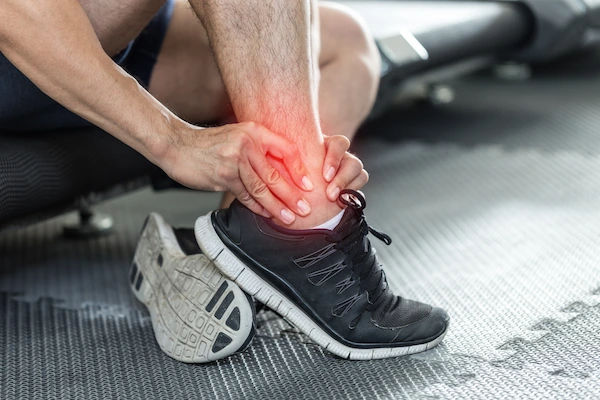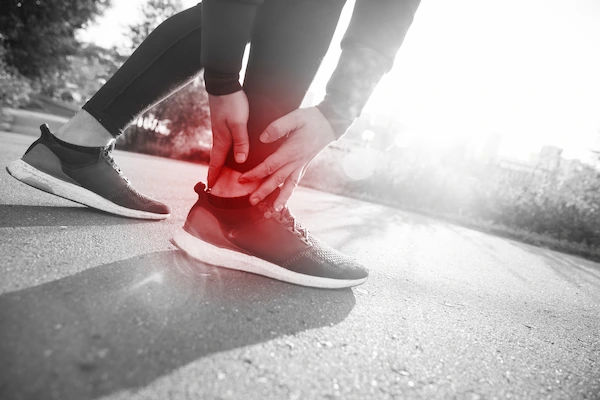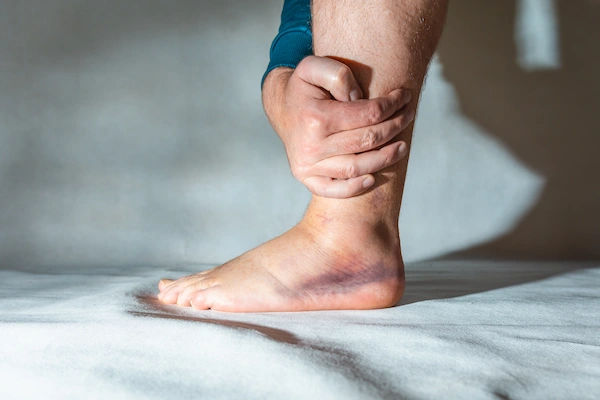Healing a Sprained Ankle Overnight Tips
Learn quick tips to help heal a sprained ankle overnight. Discover effective methods like rest, compression, and elevation to reduce swelling and promote faster recovery.

Written by Dr. Mohammed Kamran
Reviewed by Dr. Rohinipriyanka Pondugula MBBS
Last updated on 13th Jan, 2026

A sprained ankle can be painful and frustrating, especially when you need to get back on your feet quickly. While complete healing takes time, there are ways to reduce pain, swelling, and speed up recovery overnight. Here’s a simple, step-by-step guide to help you manage a sprained ankle effectively.
What is a Sprained Ankle?
A sprained ankle occurs when the ligaments (the tough bands of tissue that connect bones) are stretched or torn due to sudden twisting or rolling of the ankle. This can happen during sports, walking on uneven surfaces, or even just misstepping.
Common Symptoms of a Sprained Ankle
Pain, especially when putting weight on the foot
Swelling and bruising
Tenderness to touch
Stiffness or difficulty moving the ankle
Can You Really Heal a Sprained Ankle Overnight?
While a severe sprain may take weeks to heal fully, mild to moderate sprains can see significant improvement overnight with the right care. The key is reducing inflammation and supporting the healing process.
Overnight Healing Tips for a Sprained Ankle
Here are some tips to heal a sprained ankle overnight:
1. Follow the R.I.C.E. Method (Immediately After Injury)
The R.I.C.E. method is the gold standard for treating sprains:
Rest: Avoid putting weight on the injured ankle. Use crutches if needed.
Ice: Apply an ice pack (wrapped in a cloth) for 15-20 minutes every 1-2 hours to reduce swelling.
Compression: Use an elastic bandage (like an ACE wrap) to gently compress the ankle, but not too tight.
Elevation: Keep your ankle raised above heart level (on pillows) to minimise swelling.
Consult Top Specialists
2. Use a Supportive Brace or Splint Overnight
Wearing an ankle brace or splint while sleeping helps stabilise the joint, preventing further injury and promoting healing.
3. Take Over-the-Counter Pain Relief (If Needed)x
Ibuprofen (Advil, Motrin) or Naproxen (Aleve) can help reduce pain and inflammation.
Acetaminophen (Tylenol) can relieve pain but doesn’t reduce swelling.
Always consult a doctor before taking medication, especially if you have other health conditions.
4. Try Natural Anti-Inflammatory Remedies
Turmeric or Ginger Tea: Both have natural anti-inflammatory properties.
Arnica Gel: Applying arnica can help reduce bruising and swelling.
5. Gentle Movement Before Bed
Once swelling reduces slightly, gently move your ankle in circles or up and down to improve blood flow. Avoid forcing it if it’s too painful.
6. Keep the Ankle Elevated While Sleeping
Prop your foot on a pillow to keep it elevated overnight. This helps drain excess fluid and reduces morning swelling.
What NOT to Do with a Sprained Ankle
Don’t apply heat in the first 48 hours (it can increase swelling).
Avoid walking or putting weight on it if it’s too painful.
Don’t wrap the bandage too tightly (it can cut off circulation).
When to See a Doctor?
Most mild sprains heal with home care, but seek medical attention if:
Severe pain and inability to walk
Numbness or tingling in the foot
No improvement after 2-3 days
Ankle looks deformed (possible fracture)
Preventing Future Ankle Sprains
Wear supportive shoes (especially during sports).
Strengthen ankle muscles with exercises like toe raises and balance drills.
Warm up before exercise to improve flexibility.
Conclusion
While a sprained ankle won’t heal completely overnight, these tips can significantly reduce pain and swelling, helping you recover faster. Listen to your body, give it the rest it needs, and seek medical help if symptoms worsen.
Consult Top Specialists
Consult Top Specialists

Dr. Anil Pradeep Jadhav
Orthopaedician
23 Years • MBBS MS (Ortho)
Nashik
Apollo Hospitals Nashik, Nashik
(25+ Patients)

Dr. Padam Singh Gautam
General Physician/ Internal Medicine Specialist
43 Years • M.B.B.S (WARDHA M. S.), F.A.G.E. (MANIPAL), F.A.I.M.S. (Pb.), M.A.I.M.S. (Pb.), M.R.S.H. (LONDON)
Noida
Dr Padam Singh Gautam Fracture Clinic, Noida

Dr. Suraj Prakash
Orthopaedician
5 Years • MBBS, MS (Ortho)
Bengaluru
Apollo Clinic, Indiranagar, Bengaluru

Dr. Susheel B
Orthopaedician
13 Years • MBBS, MS, Ortho Fellowship in Trauma ( Germany) Fellowship in Arthroscopy and Arthroplasty ( Switzerland)
Bengaluru
Apollo Medical Center, Marathahalli, Bengaluru

Prof. Dr. Jambu N
Orthopaedician
23 Years • MBBS, M.S Ortho, FRCS ,FACS
Chennai
Apollo Speciality Hospitals Vanagaram, Chennai
(150+ Patients)



